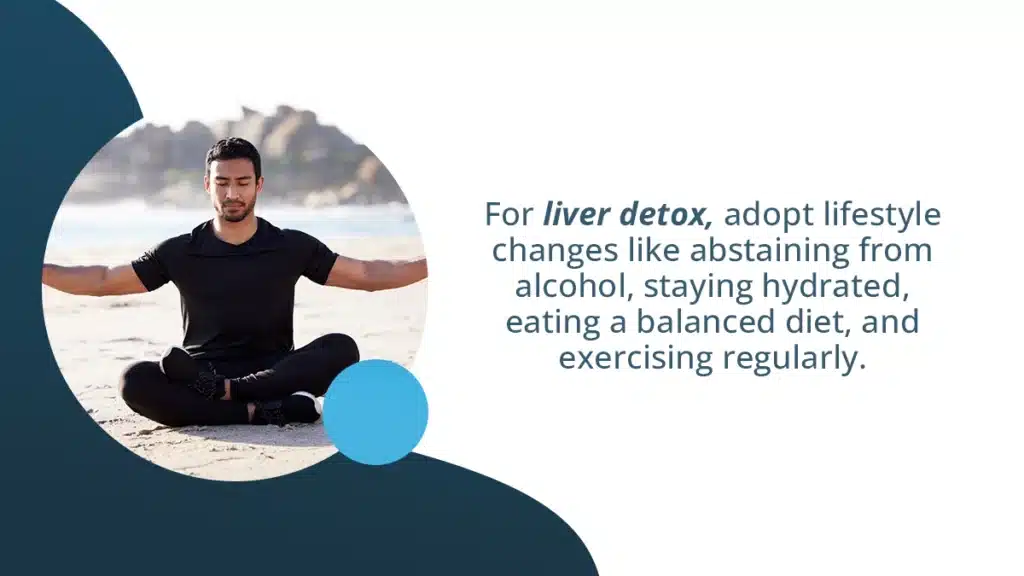Detoxing your liver from alcohol is an essential step for improving your health and well-being. When you drink alcohol, your liver works hard to break it down and remove it from your body. Over time, heavy drinking can harm your liver and make it difficult for it to function properly.
Detoxification helps your liver recover by giving it a break from alcohol and supporting its natural healing process. This involves more than just stopping drinking. It also includes making healthy lifestyle choices to support liver health. Let’s delve into practical steps to detox your liver effectively.
Key Takeaways
Detoxifying the liver from alcohol is essential for improving overall health and restoring liver function. Here is what you need to know:
- Monitoring symptoms and using medical tests are essential for evaluating liver health and detecting potential issues.
- Key steps to liver detox include abstaining from alcohol, staying hydrated, eating a balanced diet, and incorporating exercise and supplements.
- Tracking symptoms, attending regular check-ups, and making long-term lifestyle changes are vital for successful liver recovery.
Reach out to The Haven Detox-South Florida at (561) 328-8627 to get the necessary support in your recovery from alcohol use disorder (AUD).

Understanding Liver Detoxification
Liver detoxification is the process of helping your liver get rid of harmful substances, including alcohol. Your liver plays a vital role in breaking down alcohol and other toxins that enter your body. When you consume alcoholic drinks, your liver works hard to process and remove it. However, excessive drinking can overload your liver, making it harder for it to perform its functions effectively.
Detoxifying your liver means giving it a break from alcohol and other toxic substances. This allows the liver to recover and repair itself. A healthy liver can then work more efficiently to filter out toxins from your blood. Detox often involves lifestyle changes such as eating a balanced diet, staying hydrated, and getting enough sleep. These steps support liver health and help it function better.
Assessing The Liver’s Condition
To ensure your liver is healthy, it’s important to recognize signs of stress and know when to seek help. Here’s how you can assess your liver’s condition:
Symptoms Of Liver Stress From Alcohol
When the liver is under stress from heavy alcohol consumption, it can show several symptoms. Common signs include persistent fatigue, unexplained weight loss, and abdominal pain. You may also notice yellowing of the skin or eyes, known as jaundice. Dark urine and light-colored stools are other indicators. If you experience these symptoms, paying attention and considering taking steps to improve liver health is vital.
Medical Tests For Liver Health
Doctors use various tests to check liver health. Blood tests, like liver function tests, measure liver enzyme levels, which indicate liver damage. An ultrasound or CT scan might be performed to check for liver inflammation or scarring. In some cases, a liver biopsy may be required to determine the extent of liver damage. These tests help clearly show how well your liver is functioning.
When To Seek Professional Assistance
Seek professional medical help if you notice symptoms of liver stress or abnormal test results. Consult a healthcare provider if you experience insistent symptoms or have worries about your liver health. Early intervention can stop further damage and ensure appropriate professional treatment. If you have a history of heavy alcohol use or chronic liver issues, regular check-ups are essential to maintain liver health.
Remember, keeping a healthier lifestyle and staying informed about liver health is essential to ensuring your liver remains in good condition.
Steps To Detox The Liver From Alcohol
Detoxifying your liver after long-term alcohol use is important for your overall health. Here are some essential steps to help you support your liver’s recovery and ensure your body heals effectively.
Abstaining From Alcohol
The first and most crucial step in detoxing your liver is to stop drinking alcoholic beverages completely. This is essential because excessive alcohol consumption can damage the liver and hinder the detox process. Giving up alcohol allows your liver to start healing and reduces the toxic load it must handle. This step may be challenging, but it’s the foundation of any liver detox plan.
Hydration And Its Importance
Staying well-hydrated is key to supporting liver health during detox. Drinking a lot of water helps flush out toxins from your body, including those processed by the liver. Aim for at least 8-10 glasses of water a day. Proper hydration also helps balance electrolytes and supports overall bodily functions. Drinking water can aid in the detoxification process and make you feel better overall.
Balanced Nutrition
Eating a balanced diet is essential for the liver detoxification process. Focus on including fruits, veggies, whole grains, and lean proteins in your meals. Antioxidant-rich foods like leafy greens and berries help protect and repair liver cells. In addition, avoid fatty, sugary, and processed foods, as they can stress the liver further. A healthy diet supports your liver’s ability to process and eliminate toxins.
Incorporating Supplements
Certain supplements can support liver health during detox. Milk thistle and dandelion root are commonly used to aid liver function. These supplements contain compounds that may help protect the liver from severe damage and support its healing. However, speaking with a healthcare professional before starting any new dietary supplements is essential to make sure they are appropriate for you.
Physical Activity
Regular physical activity is one of the best ways to detoxify the liver. Exercise assists in improving blood circulation and promotes the removal of toxins through sweat. Aim for at least 30 minutes of moderate exercise most days of the week. Walking, jogging, or cycling can enhance liver function and support overall health. Staying active also helps manage weight and reduces stress on the liver.
Addressing Mental Health Concerns
Mental health plays an important role in liver detoxification. Stress, anxiety, and depression can negatively affect your liver’s ability to function properly. Finding healthy ways to manage and enhance your mental well-being is essential. Consider activities like therapy, counseling, or engaging in hobbies that bring you joy. Supporting your mental health can contribute to a successful liver detox process.
Get Proper Sleep
Getting adequate sleep, including liver detox, is vital for the body’s detoxification. During sleep, the body works to mend and rejuvenate itself. Aim for 7-9 hours of quality sleep each night to support liver health. Good sleep hygiene, such as maintaining a regular sleep routine and creating a restful space, can enhance the effectiveness of your liver detox efforts.
Practice Stress Management
Managing stress effectively is essential for liver health. High levels of stress can affect liver function and hinder the detox process. Incorporate stress-reducing techniques such as deep breath exercises, meditation, or yoga into your daily routine. These methods can aid you in staying calm and support your liver in its recovery. Regular stress management can improve both your mental and physical health.
By following these steps, you can overcome alcohol-related liver damage. Each step is crucial in helping your liver detoxify and regain health.
Monitoring Progress And Maintaining Liver Health
Monitoring your progress and making long-term changes are essential to ensuring your liver remains healthy and recovers well. Here’s how you can stay on track with your liver health.
Tracking Symptoms And Improvements
Monitoring your symptoms is vital to see how well your liver responds to detox efforts. Keep a journal of any symptoms you experience, like fatigue or jaundice, and note any changes. This can help you identify improvements and areas that need more attention. Tracking your progress also allows you to fine-tune your lifestyle as needed and stay motivated on your journey to better health.
Regular Medical Check-Ups
Scheduled medical check-ups are crucial for assessing liver health. Your doctor can perform blood tests and other evaluations to monitor liver function and catch potential issues early. Regular visits allow you to receive professional advice and adjust your health plan based on medical findings. Follow your doctor’s recommendations and attend all scheduled appointments to stay on top of your liver health.
Long-Term Lifestyle Adjustments
Maintaining liver health requires long-term lifestyle changes. Continue following a balanced diet, staying hydrated, and exercising regularly. Avoiding excessive alcohol use and managing stress are also key to long-term success. These adjustments help support your liver’s function and prevent future problems. By making these habits a part of your daily life, you can ensure ongoing liver health and overall well-being.
Following these steps ensures that your liver remains strong and functions effectively, contributing to your overall health and quality of life.
Frequently Asked Questions (FAQ)
Can liver damage from alcohol be reversed?
Alcohol-related liver disease can often be reversed if detected early. In the initial stages, such as alcoholic fatty liver disease, quitting alcohol and making healthy lifestyle changes like improving diet and exercise can lead to significant improvement. This organ has an amazing ability to heal itself under these conditions.
However, more advanced damage, like alcoholic hepatitis or alcohol-related cirrhosis, is typically irreversible. In severe liver damage, the attention shifts to managing symptoms and preventing further damage. Early intervention and medical support are crucial for improving liver health and preventing progression.
What specific foods and beverages can help detoxify the liver?
Certain foods and beverages can support liver detoxification. Green leafy vegetables, like kale and spinach, are rich in antioxidants and help reduce liver inflammation. Beets and carrots, high in beta-carotene, also aid liver function. Garlic contains sulfur compounds that boost liver enzyme activity.
Incorporating fruits like lemons and grapefruits, high in vitamin C and antioxidants, can enhance liver detoxification. Green tea, rich in catechins, supports liver health by improving enzyme activity. Keeping yourself hydrated with plenty of water is crucial for flushing out toxins.
How to detoxify your liver from alcohol?
To detoxify your liver from alcohol:
- Start by quitting drinking to stop further damage.
- Focus on a healthy diet with plenty of fruits, veggies, and whole grains to support liver health.
- Stay hydrated by drinking a lot of water to help flush out toxins.
Regular exercise can also improve liver function and overall health.
Consider taking supplements like milk thistle and vitamin B complex, which may support liver repair. Avoid processed foods, excessive salt, and sugar, which can burden the liver. Consulting a healthcare provider for medical advice and monitoring is essential for effective detoxification and recovery.
Seek Professional Help At The Haven Detox-South Florida
If you’re battling alcohol addiction, The Haven Detox-South Florida is here to help you. Our medical professionals provide a comprehensive treatment plan to guide you every step of the way.
We begin with a medical detox program designed to safely cleanse your body of waste products. This crucial first step prepares you for the next phase of your recovery process. Following detox, you’ll move into our residential treatment program and receive 24/7 care. Our intensive program includes therapies, medications, IV treatments, and nutritional and peer support.Don’t wait any longer to take control of your life. Call us today at (561) 328-8627 to learn how we can help you begin your path to a healthier, happier future.







